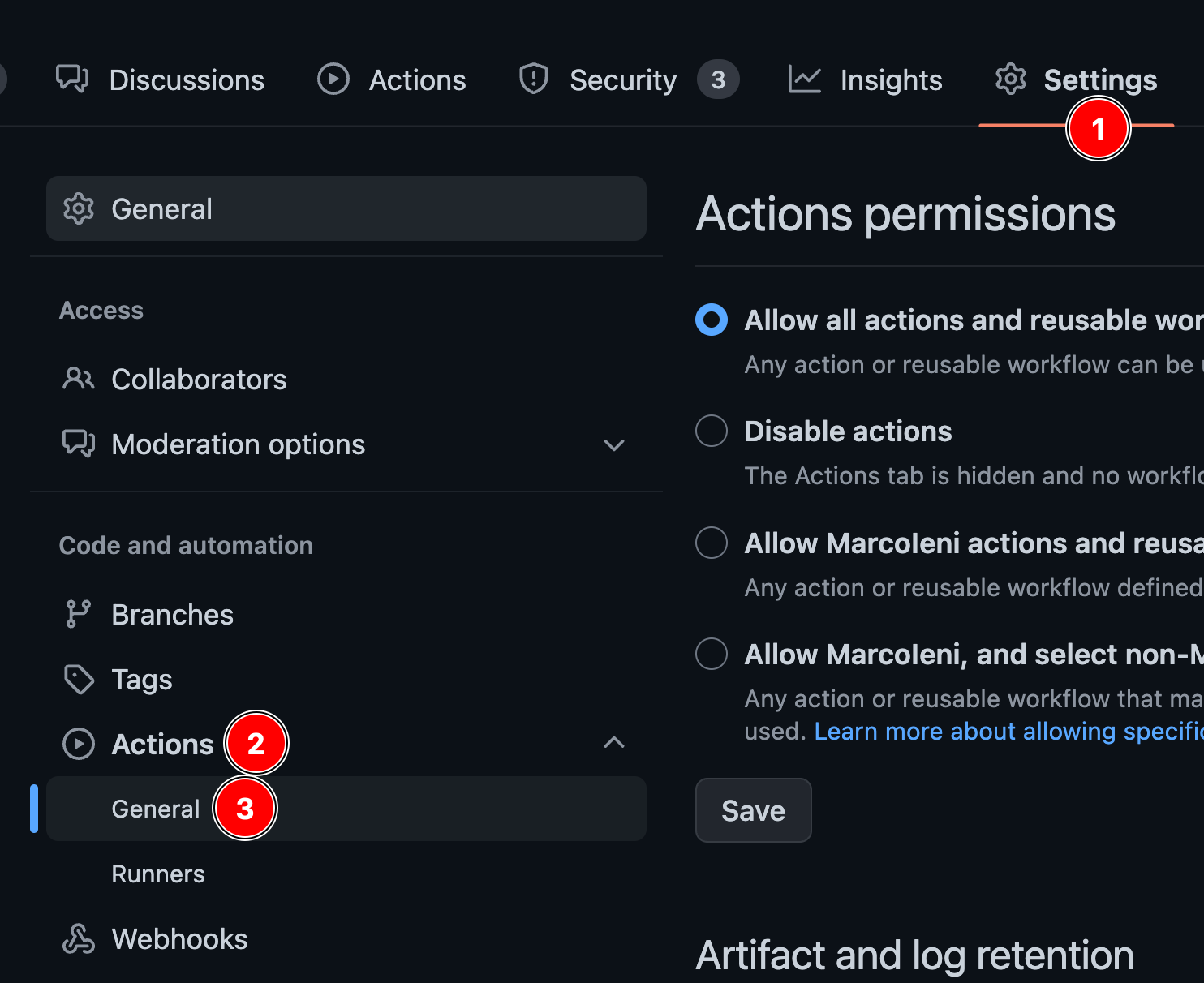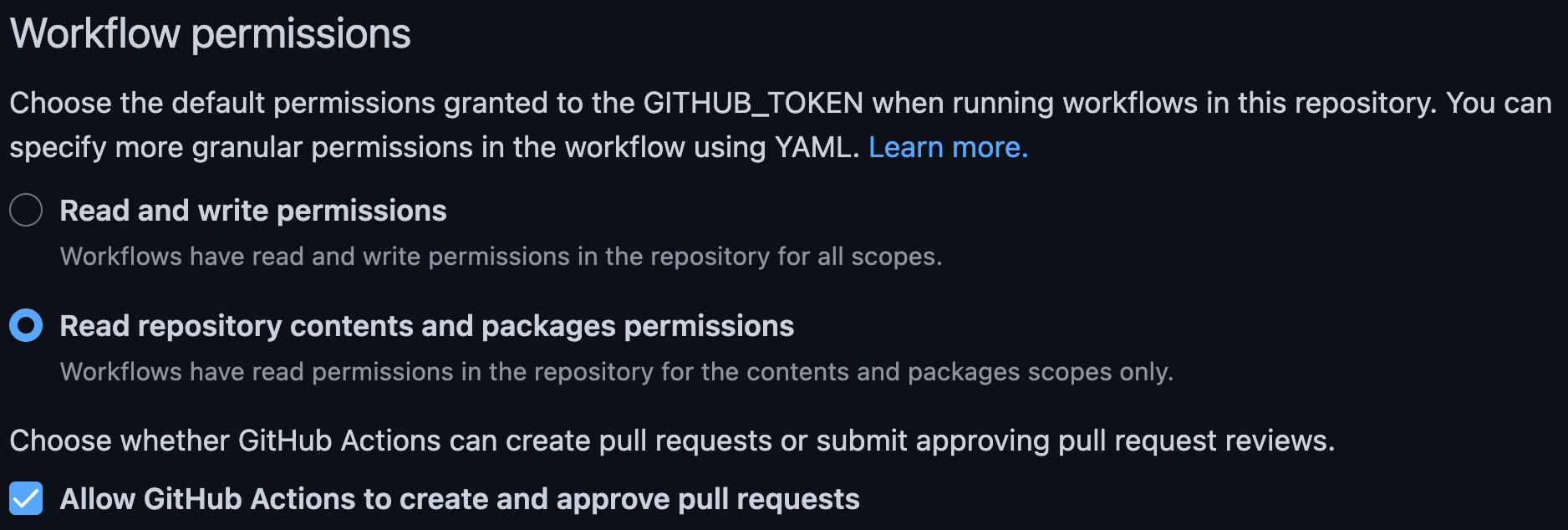Quickstart
This guide shows how to run the release-plz GitHub Action every time you merge a commit to the main branch. The workflow will have two jobs, running the following commands:
release-plz release-pr: creates the release pr.release-plz release: publishes the unpublished packages.
Follow the steps below to set up the GitHub Action.
1. Change GitHub Actions permissions
-
Go to the GitHub Actions settings:

-
Change "Workflow permissions" to allow GitHub Actions to create and approve pull requests (needed to create and update the PR).

2. Set the CARGO_REGISTRY_TOKEN secret
If you want to use trusted publishing,
don't use the
rust-lang/crates-io-auth-action
action, and don't set the CARGO_REGISTRY_TOKEN
secret (if you already use CARGO_REGISTRY_TOKEN, remove it from your workflow file entirely).
release-plz implements the same crates-io API calls of the rust-lang/crates-io-auth-action
action, and uses them to obtain a token when necessary.
Set id-token: write in the permissions of the job that runs release-plz release.
Remember to follow the crates.io docs to set up trusted publishing for all your crates. Also, new crates can't be published with trusted publishing — you need to publish them manually the first time. This is a limitation of crates.io, not release-plz.
Release-plz needs a token to publish your packages to the cargo registry.
- Retrieve your registry token following this guide.
- Add your cargo registry token as a secret in your repository following this guide.
As specified in the cargo publish
options:
- The token for crates.io shall be specified with the
CARGO_REGISTRY_TOKENenvironment variable. - Tokens for other registries shall be specified with environment variables of the form
CARGO_REGISTRIES_NAME_TOKENwhereNAMEis the name of the registry in all capital letters.
If you are creating a new crates.io token, specify the scopes publish-new and publish-update:

3. Setup the workflow
Create the release-plz workflow file under the .github/workflows directory
(for example .github/workflows/release-plz.yml)
and copy the following workflow:
name: Release-plz
on:
push:
branches:
- main
jobs:
# Release unpublished packages.
release-plz-release:
name: Release-plz release
runs-on: ubuntu-latest
permissions:
contents: write
steps:
- &checkout
name: Checkout repository
uses: actions/checkout@v6
with:
fetch-depth: 0
persist-credentials: false
- &install-rust
name: Install Rust toolchain
uses: dtolnay/rust-toolchain@stable
- name: Run release-plz
uses: release-plz/action@v0.5
with:
command: release
env:
GITHUB_TOKEN: ${{ secrets.GITHUB_TOKEN }}
CARGO_REGISTRY_TOKEN: ${{ secrets.CARGO_REGISTRY_TOKEN }}
# Create a PR with the new versions and changelog, preparing the next release.
release-plz-pr:
name: Release-plz PR
runs-on: ubuntu-latest
permissions:
contents: write
pull-requests: write
concurrency:
group: release-plz-${{ github.ref }}
cancel-in-progress: false
steps:
- *checkout
- *install-rust
- name: Run release-plz
uses: release-plz/action@v0.5
with:
command: release-pr
env:
GITHUB_TOKEN: ${{ secrets.GITHUB_TOKEN }}
CARGO_REGISTRY_TOKEN: ${{ secrets.CARGO_REGISTRY_TOKEN }}
To avoid release-plz failing in forks, add the following if statement to each job:
if: ${{ github.repository_owner == 'YOUR_ORG' }}
For example:
jobs:
release-plz-release:
name: Release-plz release
runs-on: ubuntu-latest
if: ${{ github.repository_owner == 'marco' }}
Workflow explanation
This optional section adds comments to the above workflow, to explain it in detail.
# Name of the workflow: you can change it.
name: Release-plz
# The action runs on every push to the main branch.
on:
push:
branches:
- main
jobs:
# Release unpublished packages.
# If you want release-plz to only update your packages,
# and you want to handle `cargo publish` and git tag push by yourself,
# remove this job.
release-plz-release:
name: Release-plz release
runs-on: ubuntu-latest
# Used to push tags, and create releases.
permissions:
contents: write
steps:
- &checkout
name: Checkout repository
uses: actions/checkout@v6
with:
# `fetch-depth: 0` is needed to clone all the git history, which is necessary to
# release from the latest commit of the release PR.
fetch-depth: 0
persist-credentials: false
# Use your favorite way to install the Rust toolchain.
# The action I'm using here is a popular choice.
- &install-rust
name: Install Rust toolchain
uses: dtolnay/rust-toolchain@stable
- name: Run release-plz
uses: release-plz/action@v0.5
with:
# Run `release-plz release` command.
command: release
env:
GITHUB_TOKEN: ${{ secrets.GITHUB_TOKEN }}
CARGO_REGISTRY_TOKEN: ${{ secrets.CARGO_REGISTRY_TOKEN }}
# Create a PR with the new versions and changelog, preparing the next release.
# If you want release-plz to only release your packages
# and you want to update `Cargo.toml` versions and changelogs by yourself,
# remove this job.
release-plz-pr:
name: Release-plz PR
runs-on: ubuntu-latest
permissions:
# Used to create and update pull requests.
pull-requests: write
# Used to push to the pull request branch.
contents: write
# The concurrency block is explained below (after the code block).
concurrency:
group: release-plz-${{ github.ref }}
cancel-in-progress: false
steps:
# Reuse previous steps via YAML anchors.
- *checkout
- *install-rust
- name: Run release-plz
uses: release-plz/action@v0.5
with:
# Run `release-plz release-pr` command.
command: release-pr
env:
GITHUB_TOKEN: ${{ secrets.GITHUB_TOKEN }}
# In `release-plz-pr` this is only required if you are using a private registry.
CARGO_REGISTRY_TOKEN: ${{ secrets.CARGO_REGISTRY_TOKEN }}
Concurrency
The concurrency block guarantees that if a new commit is pushed while
the job of the previous commit was still running, the new job will
wait for the previous one to finish.
In this way, only one instance of release-plz release-pr will run in the
repository at the same time for # the same branch, ensuring that there are
no conflicts.
See the GitHub docs
to learn more.
We can't use the same concurrency block in the release-plz-release job
because the concurrency block cancels the pending job if a new commit is
pushed — we can't risk to skip a release.
This is an example commit sequence where the release would be skipped:
- Commit 1: an initial commit is pushed to the main branch.
release-plz releaseruns. - Commit 2: a second commit is pushed to the main branch. The job of this commit is pending, waiting for Release-plz to finish on Commit 1.
- Commit 3: a third commit is pushed to the main branch. The job of commit 2 is canceled, and the job of commit 3 is pending, waiting for Release-plz to finish on Commit 1.